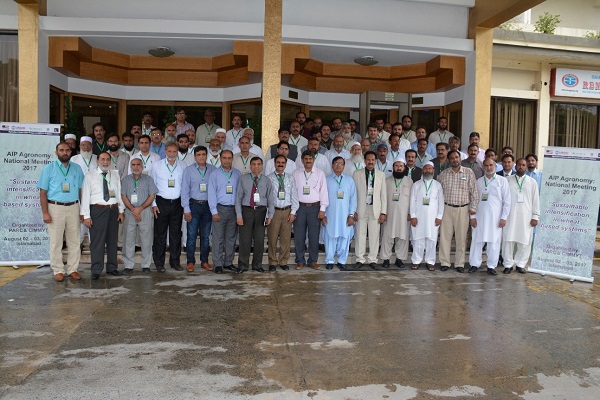ISLAMABAD (CIMMYT) – Agronomy experts from across Pakistan gathered earlier this month to discuss progress in Pakistan since 2014 under the USAID funded Agricultural Innovation Program (AIP). At the meeting, 23 national partners shared their progress and evaluation of new techniques, planters and their dissemination in the wheat based systems of Pakistan.
The International Maize and Wheat Improvement Center (CIMMYT) and the Pakistan Agricultural Research Council (PARC) drew 80 participants from both private and public spheres to the conference where they discussed key issues such as Pakistan’s large yield gap, residue management techniques and ways to increase efficiency in fertilizer and water management.
AIP has reached more than 11,000 farmers in Pakistan through demonstration, training and farmer days. AIP promotes dissemination of sustainable farming activities such as zero-tillage wheat planting after rice and legume crops, ridge planting of wheat, improved fertilizer management in wheat and rice, direct seeding with multi-crop planters, wheat panting with Zero-Tillage Happy Seeders in rice residue and maize planting with small planters in Pakistan.
In Pakistan, wheat is grown on more than 9 million hectares annually, yielding roughly 2.8 tons of grain per hectare, yet falls below the global average of 3.2 tons per hectare due to a wide yield gap, improper residue management techniques, inefficient fertilizer and water management.
Ghulam Muhammad Ali, Member and AIP focal person of PARC, said that there is a need to increase per unit area productivity in the crop sector as cultivated land is decreasing because of housing and climate-related degradation. Private sector active involvement in research and dissemination would also help to increase agriculture productivity in the country.
AIP is working with private-public partnerships to move beyond educating stakeholders in new technologies to helping farmers implement them in their fields. Their efforts have resulted in the local manufacturing and provision of planters and seeders to over 300 farmers in the provinces of Punjab, Khyber Pakhtunkhwa, Sindh and Balochistan, according to AIP Project Leader Imtiaz Muhammad.
All of the provided machines are operated under the practice of zero tillage, meaning farmers directly sow new seeds into the residue of the previous crop grown. The tools also help farmers maximize their production, since they sow seeds using an inverted T opener that breaks up the soil then distributes seeds evenly. Research has shown these methods increase yield and decrease carbon footprint.
Farmers preferred these machines due to their increased planting speed, reduction in loss of seed and seed breakage and the increased yield they saw using these machines. Local producers of zero-till machinery, such as Greenland Engineering are also benefiting, their sales have almost tripled, from 37 in 2016 to 150 in 2017 as adoption of the technology has expanded.
Azeem Kahan, Director General of the National Agricultural Research Center in Islamabad, emphasized the need for a national database of resource conserving technology such as planters and seeders, and said that the PARC collaboration with CIMMYT will focus on coordination that will help stakeholders share their knowledge about agronomic interventions in Pakistan.

 Capacity development
Capacity development 
